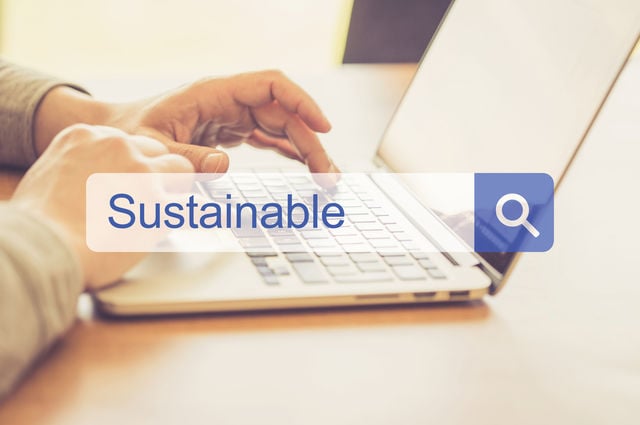The Best Sustainability Resources: Knowledge for Responsible Hoteliers
17 experts shared their view
You wonder what ecosystem services are and why it matters to the hospitality sector? Everyone is talking about net zero carbon but are they all talking about the same thing? You have heard of hotels engaging in more circularity, adopting nature-based solutions and implementing a carbon offsetting scheme, but what does this all mean?
The world of sustainability is riddled with specialized, often technical, jargon. Online glossaries of sustainability terminology are available, however, context - rather than definitions - matters to ensure a greater comprehension of complex terms.
In the greater context of sustainability news, information, reports and research, not all sources are created equal. In a world of information overload [1], using reliable sources with credible, and relevant information is critical.
Thinking of generic sustainability material or hospitality-specific sustainability information, what are your Top 3 online resource recommendations for anyone wishing to stay on top of the game?
Note: Do specify a category - if applicable - for the recommended online resource such as 'Sustainable Technology Innovation News', 'Climate Change Research' or 'Sustainable Hospitality Best Practices Database'
Reference
[1] Pillay, S. (2017). The Ways Your Brain Manages Overload, and How to Improve Them. Harvard Business Review. https://hbr.org/2017/06/the-ways-your-brain-manages-overload-and-how-to-improve-them
With sustainability increasing in importance in the eyes of consumers, governments and the public and private sectors, and the financial business case growing, the hospitality industry recognises that sustainability needs to be a key priority for any resilient business. There can be uncertainty, from all sides, around what are the most meaningful sustainability actions. Fortunately, there are several sources of free and credible tools and resources to support the industry to advance their sustainability practices. Here are three sources selected to cover a range of sustainability areas:
- Sustainable Hospitality Alliance – Our mission is to enable the hospitality industry to have a lasting positive impact on our planet and its people. We work with our member hotel companies and other strategic partners to create free practical programmes, tools, trainings and resources which are available to every hotel. These include resources such as training materials to support disadvantaged people to begin a career in hospitality, and materials on ethical recruitment and mitigating human rights risks, in addition to a range of environmental tools and guidance covering carbon, water, and consumption and production. In March, we will be releasing our Pathway to Net Positive Hospitality – a practical guide featuring different stages to enable every hotel to improve their environmental impact. It aims to build on the existing tools and initiatives, from across the industry and beyond, to create a holistic approach for the hospitality industry to improve environmental sustainability.
- One Planet Sustainable Tourism Programme (led by UNEP and UNWTO) – Providing guidance, tools and resources to support sustainable consumption and production in tourism. Their initiatives include the Global Tourism Plastics Initiative (GTPI) to address the causes of plastic pollution and the Glasgow Declaration for Climate Action to reach Net Zero emissions as soon as possible before 2050. Their tools and resources include support for tourism businesses to eliminate single-use plastics, engage with the value chain, and support action to cut carbon emissions.
- Global Sustainable Tourism Council – As a recognised body for establishing and managing global standards for sustainable travel and tourism, the GSTC Criteria can provide a useful source of actions to support tourism businesses to improve their sustainability planning, provide benefits to the local community and reduce negative impacts to the environment.
We welcome all parts of the industry to visit our website to utilise our free materials and we look forward to providing further guidance to navigate the wealth of resources that are available to the industry through our Planet Pathway in March.
Favourite Corporate Responsibility sources
HOSPITALITY
- SHA resources https://sustainablehospitalityalliance.org/
- WTTC resources https://wttc.org/Initiatives/Sustainable-Growth
CLIMATE CHANGE
- Book and organization: Project Drawdown - https://drawdown.org/
- Climate Home News https://www.climatechangenews.com/– Weekly newsletter. Contact for registration Alex Brooks [email protected] .
- The Guardian sustainability https://www.theguardian.com/uk/sustainable-business & weekly newsletter
- Countries' net zero tracker https://eciu.net/netzerotracker
It is hard to mention only three sustainability materials or hospitality-specific websites. Here there are some recommendations;
- Nature-related Research News - https://tnfd.global/resources/
- Responsible Investment News - esgtoday
- Human Rights Research and Benchmarking News - World Benchmarking Alliance https://assets.worldbenchmarkingalliance.org/app/uploads/2022/01/Draft-Methodology-for-the-Nature-and-Biodiversity-Benchmark-2022.pdf
- Industry Research, Best Practices, and Suppliers - eshclub/insights
- Sustainable Development Goals https://www.unglobalcompact.org/take-action/sdg-action-manager
- The Nature Conservancy
- Business & Human Rights Resource Center
- Inter-sectorial https://seedis.org/action-service/
- GSTC / Sustainable Hospitality Alliance
Sustainability is greater than just one business, and one success story. Owners who invest in carbon-positive properties should be urged to share the concept and feasibility with other businesses, to collectively make a true positive impact to the industry and the communities. Hotel owners and operating Groups are constantly getting ahead of the research market with own innovations, and new smart and practical ideas as to how to incorporate sustainability within their practices.
Hotel companies and businesses should be encouraged in being completely transparent with the public in their sustainable practices, and its corresponding impact and benefit to the environment, surrounding communities and equally, all stakeholders. But in order for them to be successful, they need to be informed. Below is a list of sources that help the industry address challenges and share solutions:
Climate Change Research, Sustainability Best Practices
The online Green Forum (https://www.thegreenforum.org) covers all aspects in relation to sustainability, climate change and an overall transformed sustainable economy including sustainability data categorized in current trending industry and climate change topics, to country specific case studies, sustainability regulations and articles featuring youth driven, innovations.
Sustainable Architecture & Design Innovations
The architectural design and functionality play a big role in a hotel property's ability to be efficient with having a truly low to no impact on the environment.
The Inhabitat online portal has coverage on current sustainability news within various industries, environmental news, climate change urgencies, and new sustainable architectural breakthroughs. Inhabitat is a green architectural, design and sustainable lifestyle forum, redefining methods in which we can reduce our carbon footprint in circulating the newest insights on renewable energy and greener building concepts.
Rethinking how we initially approach hospitality buildings and purposes, the Dezeen portal yearly reveals innovative, top sustainable building projects. With research and intel on new net positive building concepts, net-zero fast food innovations, and mixed-use sustainable building concepts, this site also has regular content replacing all traditional building materials, tools, and design concepts, with a more sustainable method. These architectural sites provide feasible research on plant-based building materials, sustainable interior designing methods, and net-positive building insulation replacements.
From Sustainability to ESG
NGOs like The Long Run are reputable options in staying updated with ESG-relevant hospitality data. The Long Run (TLR), and therefore members operates with (GER) standards that have been recognized by the Global Sustainable Tourism Council. Through memberships, hoteliers can have access to various research and global insights and concepts from private, luxurious sustainable properties. TLR focuses on 4C's (Conservation, Community, Culture, Commerce), publishing insights and relevant industry data from properties with a focus on conservation, biodiversity, sustainable agriculture.
- For industry news, trends, case examples, and technical application in the hotels: Green Lodging News www.greenlodgingnews.com.
- For more technical guidance on the wide range of topics more broadly: One Planet Network www.oneplanetnetwork.org.
- Am I allowed to shamelessly cite Greenview for technical methodology and guidance?
I was finding it hard to explain the difference between net zero and carbon neutral in an easy way that everyone would understand. Everything I found online was too long, too complicated or just not succinct enough until I found a fantastic blog by Ecologi that puts it into simple and understandable terms. Carbon-Neutral vs. Net-Zero: What's the Difference? | Ecologi.
Even when you understand the real meaning of Net Zero, it can be difficult to put procedures into practice and there is very little guidance for hotels, particularly around data collection and what is actually in scope for a hotel. I found this Net Zero Methodology Guide for Hotels and accompanying Practical Guide to Getting Started by Greenview to be a really useful set of documents for hotels. Net Zero Methodology for Hotels – Greenview.
I may also be biased about the final resource in my Top 3 - Rethinking Single-Use Plastic Products in Travel & Tourism - as I was the lead author. The brief was to write something practical and straight forward that avoided jargon and helped tourism businesses and policymakers to make more informed decisions when it came to reducing and eliminating single-use plastic, whilst also considering the impacts of alternatives. Not everything is as green as it seems and it is important that we don't solve one problem only to find we have inadvertently created others. We received particularly good feedback on the practical decision trees that can be found within the report. https://wedocs.unep.org/bitstream/handle/20.500.11822/36324/RSUP.pdf
My resource suggestions all fall into the category of “Sustainable Hospitality Best Practices”.
The UK's Council for Sustainable Business has created a Nature Handbook for Business, where you can read 25 key actions that the travel industry can take to help them on their journey to nature positive 2030: https://getnaturepositive.com/sectors/tourism/actions-for-nature/.
Sustainable Hospitality Alliance offers some useful climate action tools specific to the hospitality industry: https://sustainablehospitalityalliance.org/resources/search/?q=&action_area=climate-action&tool_type=&topic=.
Responsible Tourism News Monthly by Harold Goodwin at the Responsible Tourism Partnership is always an interesting read filled with best practice examples and up-to-date news aimed at making tourism more sustainable: https://responsibletourismpartnership.org/.
An additional “one to watch” is WTM´s Platform for Change designed to encourage replication by showcasing solutions that businesses and destinations have developed in a global effort to accelerate change: https://hub.wtm.com/responsible-tourism/platform-for-change/.
I must of course also mention my own online School for Responsible Tourism. Currently a work in progress, the site aims to offer resources, blogs, and courses for property owners who are getting started with taking responsible action on their journey towards a world where sustainable tourism is no longer a label, it just is: https://www.responsibletourism.school/.
My top 3 online resource recommendations for anyone wishing to stay on top of the game are actually mainly non- sector specific, as I think we still lack a good source in that respect which covers ESG for the hospitality and tourism sector as a whole.
Therefore I try and and keep myself informed as to what the global and European discussions around ESG, climate goals and natural capital is by reading:
1- The Financial Times, specifically The Moral Money Newsletter, which appears Wednesdays and Fridays as well as their section on 'Climate Capital' which has some outstanding journalism
2- Bloomberg Green is a daily newsletter I subscribe to which covers key global development in financial markets and policy making.
3- Hospitality Inside, published by Maria Puetz-Willems here in Germany does increasingly cover CSR stories in the hospitality sector. Maria is dedicated to good and honest journalism, and has become a passionate advocate for embracing sustainability in the sector, hence her and her team have made good progress in picking the top relevant stories. In addition, their annual Think Tank HITT has integrated ESG and sustainability as one of its core issues, hence their motivation to stay on top of developments, keep a critical eye on the ball is now imperative.
There are other, more consumer facing newsletter, amongst which the 'How to Travel better' edited by Juliet Kingsman for Conde Nast Traveller, strikes me as the best researched and most actual, covering the latest openings, eco-destinations and other trends for sustainable suppliers.
Freely accessible resources and knowledge sharing is crucial for us to all learn from each other and level up together. As we deepen relationships to form global Communities of Practice, highlighting practitioners and best practices from around the world is key.
1. Sustainable Industry Guides (Blue Guides): As a part of Oceanic Global's Blue Standard program, we have created robust programs and open-source resources for specific industries & usages that work to champion comprehensive sustainability and create measurable impact at scale. There are specific guides for Hotels, Restaurants, Events, Music Industry, and Office Spaces. Coming soon are topic-specific guides including Energy & Transportation, Supplies & Procurement, Recycling, Food Waste, Composting, Responsible Seafood, and more. Explore: https://bluestandard.com/blue-programs/
2. Books on Sustainable Development & Design: Saving the Planet by Design by: Ken Yeang, a true pioneer in the field of green building, discusses how to repurpose, reinvent, redesign, remake and recover our human-made world so that our built environment is benignly and seamlessly biointegrated with Nature to function synergistically with it. I supported with ecological footnotes throughout, and the book is a true integration of natural processes and our built environment. His recent book At One with Nature highlights specific case studies to demonstrate these concepts from his latest work.
3. Ocean Issues: Our Shared Seas has fantastic fact sheets and well-researched information to offer a "crash-course" in all threats facing our ocean. Tourism and hospitality often aggregate on coastlines, so a deeper understanding of the ocean is fundamental to guiding responsible hospitality and tourism. 70% of the surface of our planet is ocean, we live on a blue planet. Understanding the ocean will offer greater insight into our interconnected Earth system at large.
For further educational information, tips, and events, check out our brand new Education Page: https://oceanic.global/education/
As a hospitality educator, I share reliable scientific evidence with students and colleagues. To make sure I stay afloat on this rushing stream, I use three categories of resources or genres: 1) non-fiction books, 2) journalism, and 3) scientific publications. In the first category, I find coherent insights in the work of leading climate scientists with a good pen, such as Michael E. Mann. His excellent latest book, The New Climate War, reveals how from his own experience, fact finding and evidence-based discussions on climate are systematically thwarted by the vested interests and lobbying powers of (fossil fuel) corporations.
For journalism, I prefer The Guardian Climate Crisis section. This brings in scientific discoveries, data, and background stories, which makes we wonder why so little is actually done in the face of this terrifying crisis (sure enough, this question is addressed in the recent movie Don'tLookUp). Today's alarming fact? “The ocean heat content is relentlessly increasing, globally, and this is a primary indicator of human-induced climate change,” according to Kevin Trenberth, climate scientist. And that's just today's alarming fact.
For science, I look for relevant sustainability research by keeping track of search words in a simple excel file with sustainability topics, mostly hospitality-specific. Good collections of scientific insights are found at the Drawdown Project, the Dutch science collective Het Groene Brein, and of course the latest IPCC report, where the summary for policy makers is explicit.
Finally, to save myself and my students from drowning in the (warming) ocean of despair, I check in at the Dutch Happy Activist with great little videos of small smart solutions, and look around at the B-corp website, listing certified sustainable businesses.
When reading the request for this Worldpanel, my mind flew directly to websites and online resources from the WTO, the IPCC, the Natural Step, the EU, the Energy services Group, that I tend to look at for the last details about social and environmental global issues and their impact on hospitality and tourism.
Yet, immediately afterwards, I thought: which websites are consulted by those entrepreneurs in my network that I consider to be innovative and sustainability engaged?
So, I started asking around and discovered that most entrepreneurs and managers in my network tend not to look themselves but rely on companies sharing with them news about sustainability. Hoteliers working in major chains get sustainability related information aand inspiration via their headquarters. Others were relying on websites from local and national (Dutch) employers' organizations. This is of course a very efficient and effective way to get information – but you are dependent on what other people think is relevant and inspiring.
Few of the people who answered my question were looking by themselves and among these only one was looking beyond the obvious: therefore, thanks to Karin Veldhuizen (from:https://watersportcampingheeg.frl/en/) I am able to share what I think is a veery interesting place to get inspired:
https://ddw.nl/en/home - the website of the Dutch Design Week, the largest design event in Northern Europe presenting work and concepts from more than 2,600 designers.
Karin also pointed to newsletters from:
I don't have go-to websites for sustainability matters but we launched last year the Hospitality of the Future Think Tank, focusing on providing information and actionable tools and ideas around sustainability and following the UN SDGs. Our first report is available to download for free on www.hospitalitythinktank.com and look at sustainability in hospitality investment, design & construction, operations and communities.
The volume of information online pertaining to sustainability matters has grown considerably over the past years. It then comes down to quality control over the information (and not the volume).
Experts on this panel have presented already excellent resources (e.g. from Sustainable Hospitality Alliance reports and methodologies to The Guardian news reporting on environmental and sustainability issues and Project Drawdown for resource on climate solutions by sectors).
Here below are three additional resources of interest:
Nature (Multidisciplinary science journal/largely open access)
Anthropocene (Sustainability science and innovations)
Euractiv (Independent news network with focus on EU affairs with large section on Energy & Environment)
For the technical stuff, a GSTC accredited certification organization.
For sustainability leadership insights, stories, advice (e.g. how to get started, how to succeed, pitfalls to avoid,..) the Sustainability Leaders Project, Sustainability-leaders.com.
For networking ITB or WTM sustainable tourism programs.
My go-to resources are the Global Sustainable Tourism Council (GSTC) Accommodation standard, Sustainable Hospitality Alliance, and Green Lodging News.
Basic definitions and a first orientation are easy to find on common wisdom websites like Wikipedia or more specialised sources like Google Scholar, where ad hoc references are provided by keyword and standard search function, It might therefore sound slightly contrarian but I believe that there are plenty highly reliable and fairly specialized sources, like the publications by Prof. Elena Cavagnaro of NHL Stenden, The Netherlands, whereby hospitality professionals have access to qualified insights and viewpoints on sustainability, e.g. the Research in Hospitality Management online, that is open source and therefore free for all to download and read at every issue:
https://www.tandfonline.com/loi/rrhm20
Also, I would advise hospitality professionals to stretch their interests and let their ambitions fly in terms of what is possible. This means looking at sustainability standards that might not look attainable in the shorter term but might help in setting the vision and the strategic goals. In this view, it seems important to scan and monitor specialized sources even in apparently distant but not unrelated sectors, e.g. ESG standards and certification requirements in sectors like architectural design and infrastructure:
Lastly, I believe that basic understanding of sustainability requires framing sustainability itself in brand marketing processes, well beyond social media and advertising techniques but with strategic understanding of the technicalities thereof, and reframing the concepts of luxury, premium, and value from a new sustainability angle. This is because in 2006, when I was working on my 2011 book on the future of luxury and premium, I could see how a lack of framing and reframing capabilities resulted in roadblocks instead of visioning opportunities to rethink business from sustainability drivers. Here, professional resources like the soon-to-be launched Knowledge Pills by my business associate and co-author, Filiberto Amati, MBA, might provide guidance and frameworks:
https://www.amati-associates.com/the-future-of-hospitality/
Whatever the sustainable initiatives of hospitality will entail, from vegan-only three star chefs to game-changing concepts, it will not be successful unless the market, and therefore people, understand it and actually desire it. Hence, the need for brand marketing agents who have the necessary talents and ethics to push the sustainability imperative in hospitality into newly designed propositions, that will meet the increasing pull by societies, cultures, and people who are willing to invest in premium redesigned to do good.
Sustainability in hospitality is a hot topic (finally) and when being asked “what is a sustainable hotel?” by professionals, I emphasize that it's a hotel that consistently and coherently takes into consideration its impacts on people and on the planet. In other words every single decision and action in the right direction - no matter how small it is - is an essential part of a whole. As a result there is not one thing that makes a hotel sustainable and it's important to keep an eye open on scientific and professional publications to get a good overview of the variety of opportunities and options in all aspects of hotel operations.
One resource that I often recommend both to hospitality professionals and students is the Sustainable Hospitality Alliance website for its practical guides and case studies as well as its training material.
One resource that I often visit (in French) is the website of the association Acteurs du Tourisme Durable with inspiring examples, white papers, webinars and much more to tackle sustainable tourism (including but also not limited to hotels).
Finally, following members of this HN World Panel on LinkedIn is extremely useful as it helps keeping up with the latest news in a variety of categories, being aware of upcoming events and learning about initiatives all around the world !

















